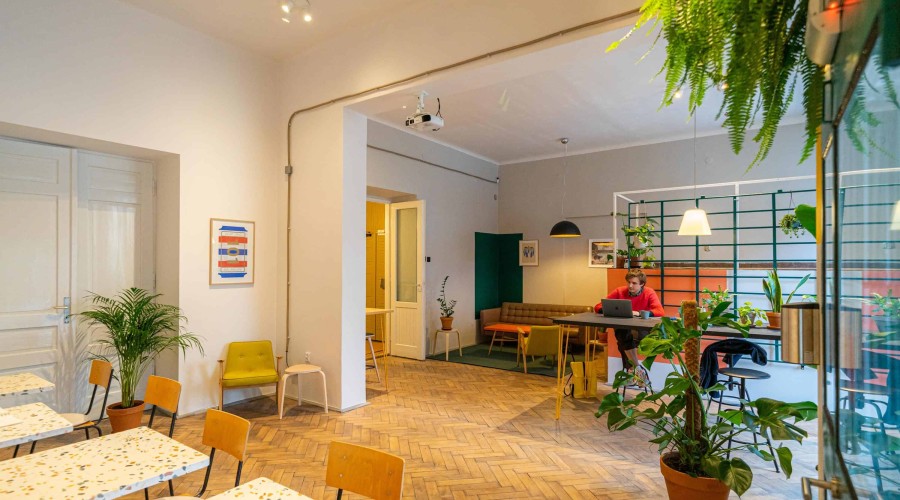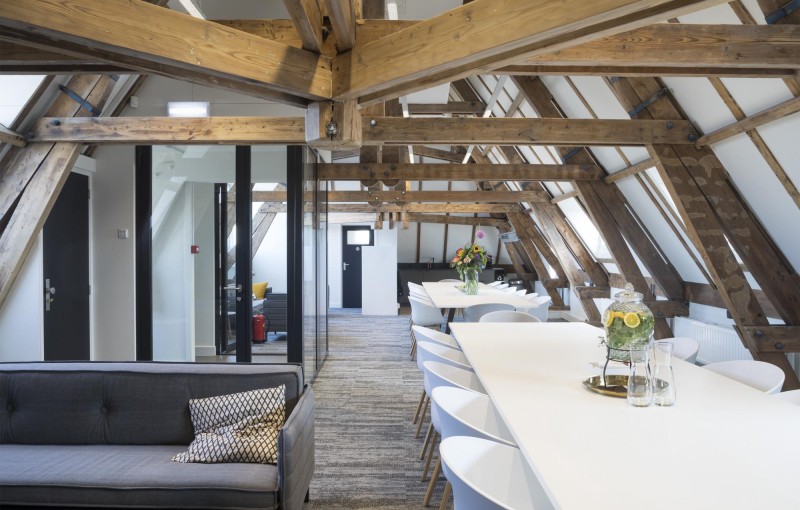
5 benefits of flexible workspaces that will make you move office!

The last few years a lot of companies have introduced flexible workspaces. But what is a flexible workspace and what are the benefits of flexible workspaces?
The COVID-19 pandemic showed us that working in a traditional office is not always possible.
Remote working and flexible workspaces became more popular during and after the pandemic.
Study conducted by TeamStage suggested that 64% of people sharing an office with a co-worker have improved on completing their tasks on time. This study also suggested that these co-workers were also better focused in these shared office spaces.
What is a flexible workspace?
A flexible workspace is a workstation, normally in a shared office space that is different compared to the standard office space. These flexible workspaces are used to work on tasks in a different setting. Compared to normal workstations, these workstations are designed to be more private, quiet or they are designed for co-working.
Usually, flexible workspaces come with creative desk layouts. A flexible workspace can be different in the layout and in the way of working. The most common flexible workspaces are:
1. Hot desks
Hot desks are traditional workplaces that are not reserved by anyone. These hot desks can be used by everyone within the flexible office space.
2. Co-working spaces
Co-working spaces are flexible workplaces that are designed for co-working. These workspaces are commonly used by multiple organizations.
Co-working spaces are workstations designed for co-working. A study conducted by Statista showed that there are approximately 4200 co-working office spaces in Europe. Check out this blog to see the benefits of co-working spaces
3. Open offices
Open offices are office spaces that are shared by employees and have an open layout. This open layout makes it easier for employees to ask questions to each other.
What are the benefits of flexible workspaces?
1. Working in a different place.
Working remote or from a flexible workspace gives a lot of possibilities. Employees can work at any place they want..
This can be at home, in the city and even on vacation. Employees that work at home can be in the presence of their family and loved ones.
Traditional offices can have a very serious and tense setting. The option of having a different setting can give a comforting and relaxing feeling to employees. Employees that work with flexible workspaces can work at a place with no distractions. Letting them focus on their tasks completely.
Having a flexible workspace can increase the employee satisfaction and relieve stress.
2. Easier to work with co-workers.
Working in a standard office it can be difficult to work with a co-worker. The noise within the office can be loud. A lot of offices also do not have any rooms that can be used for co-working. This will leave co-working employees with less privacy and ultimately cause the work efficiency to decrease.
Flexible workspaces can be anywhere. This makes co-working remotely way easier than ever before. Co-workers can plan a meeting online or meet face-to-face in an area close to the co-workers' homes.
This remote meeting will be more private and communicating will be easier. A flexible workspace in the office can also achieve these results.
Looking for an office with flexible workspaces? Contact our specialized professionals to find an office suited for you! The service provided is 100% free!
3. Saves costs.
Having employees work from flexible workspaces, can save operational expenses. A few examples would be:
- Electricity bills will be less high
When a lot of employees work remote, a lot of workspaces at the office won't need electricity.
- Cleaning services will be less expensive;
Desks reserved in the traditional office for employees working in the flexible office space will not need any cleaning. Therefore, the bills for cleaning services will be less expensive.
- Flexible rental contracts
A flexible office space is usually being paid with rent. This means that there is no long-term commitment needed towards the flexible office space. A lot of start-ups like to begin their business adventure with flexible workspaces. But nearly all companies can benefit from flexible workspaces.
Employees that work from home also have an impact on climate change. The employees decrease their carbon footprint, due to not traveling to the office.
4. Improves ICT within the company.
Flexible workspaces will become a more embedded principle within companies. With employees working remote good communication is key! Especially the online communication methods of the company need to work in order to have employees working from different flexible workspaces.
Companies that have remote workers will ultimately increase the security and quality of their internal communication systems. This will be increased due to the necessity that these communication systems have.
5. Employees can work near clients.
Another benefit of flexible workspaces is that employees working in flexible workspaces can meet with clients in the area. For this last benefit good communication is again a really important factor. Employees need to communicate where they are working from.
Meeting up with clients face-to-face will increase the customer intimacy and will increase the overall relationship with the customer.
Now that we know the benefits of flexible workspaces, we also need the disadvantages of flexible workspaces.
What are the disadvantages of a flexible workspace?
1. Not every spot is suited as a flexible workspace
Finding a quiet spot to concentrate optimally can sometimes be a hard task. For example, a local mall will most likely be too noisy to concentrate. To make finding a flexible workspace an easier task, we made a checklist of all the things needed for a flexible workspace:
- Comfortable seat;
- A desk;
- A roof (To stay dry during rainy weather);
- Outlet;
With these 4 products an employee can work anywhere they desire.
However, an office with flexible workspaces in the facility is an easier option.
2. Reliant on ICT
Having good communication systems is definitely a benefit. But remote workers are reliant on ICT. This means every time there is an error with any system, it will have an impact on the productivity of the employee.
A power outage could be the end of someone's workday.
The importance of flexible workspaces in the office
Giving employees an option to work in a different setting is very important. Employees that have the options of working remote or from a flexible workspace will be more motivated and will deliver better products/services. The benefits of flexible workspaces will be seen indirectly in the monthly results of the company.
A good office can leave clients and employees with better results. Looking for an office with flexible workspaces? Flexas.com can help you find your office! Contact our specialized professionals to find an office that is suited for you.
View offices in Amsterdam Leave an Enquiry
Found this article interesting? Try reading: Top 8 benefits of hybrid working.


